Business Communication: Self-Awareness, Ethics and Workplace Dynamics
VerifiedAdded on 2023/06/15
|7
|1737
|206
Essay
AI Summary
This essay discusses the critical role of communication, self-awareness, and ethics in the modern business environment. It highlights how effective communication is essential for achieving organizational goals, building strong employee relationships, and fostering technical leadership. The essay identifies common barriers to effective communication, such as cultural differences, noise, and jargon, and suggests strategies to overcome them, including active listening and clearly defined roles. It also emphasizes the significance of self-awareness in understanding one's strengths and weaknesses, enabling personal growth and improved interpersonal interactions. Furthermore, the essay explores the impact of cultural diversity on business and the importance of ethical decision-making in organizational operations, asserting that ethical practices are vital for maintaining a positive organizational image and making sound managerial decisions. The document is available on Desklib, a platform offering a range of study tools for students.
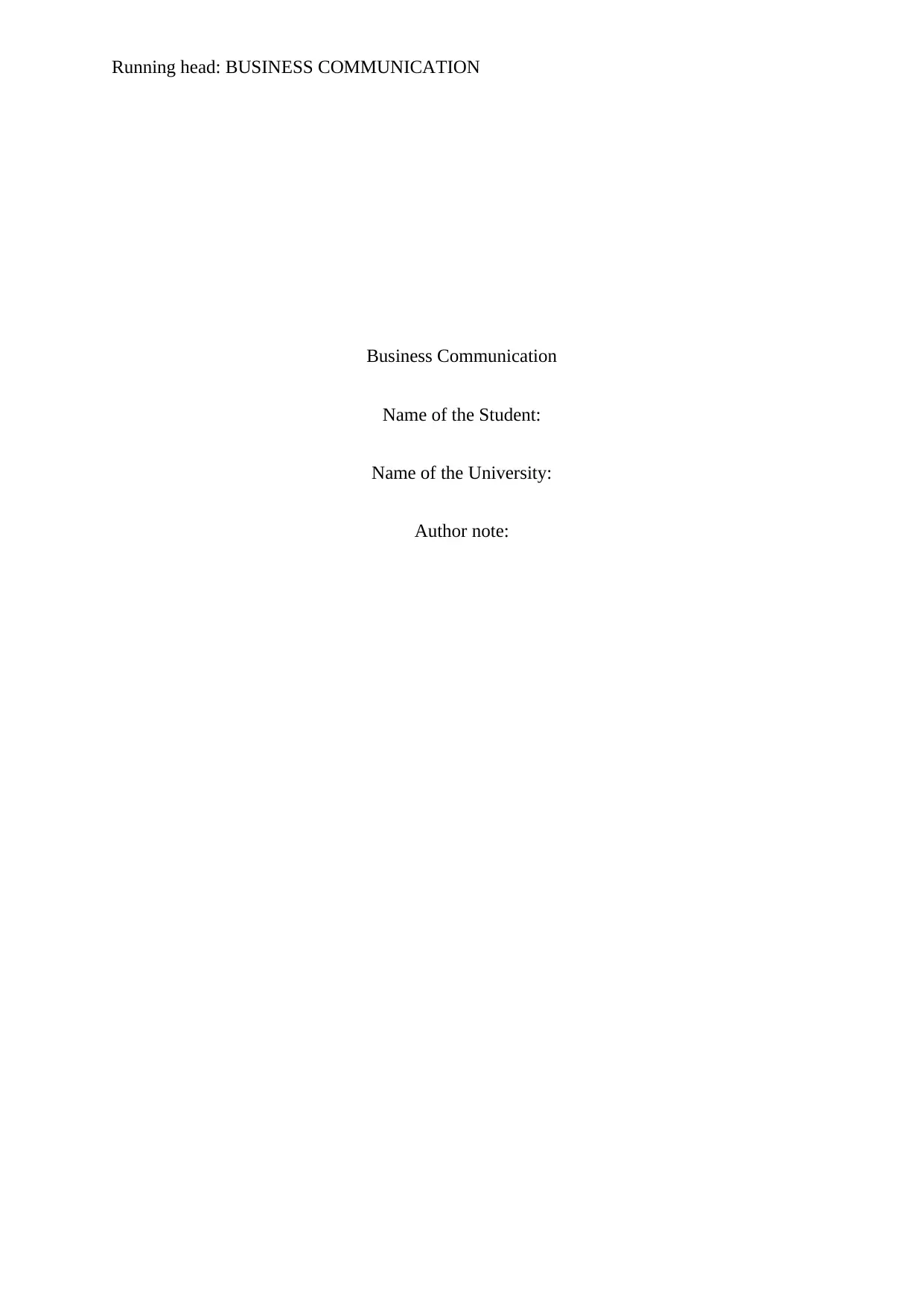
Running head: BUSINESS COMMUNICATION
Business Communication
Name of the Student:
Name of the University:
Author note:
Business Communication
Name of the Student:
Name of the University:
Author note:
Paraphrase This Document
Need a fresh take? Get an instant paraphrase of this document with our AI Paraphraser
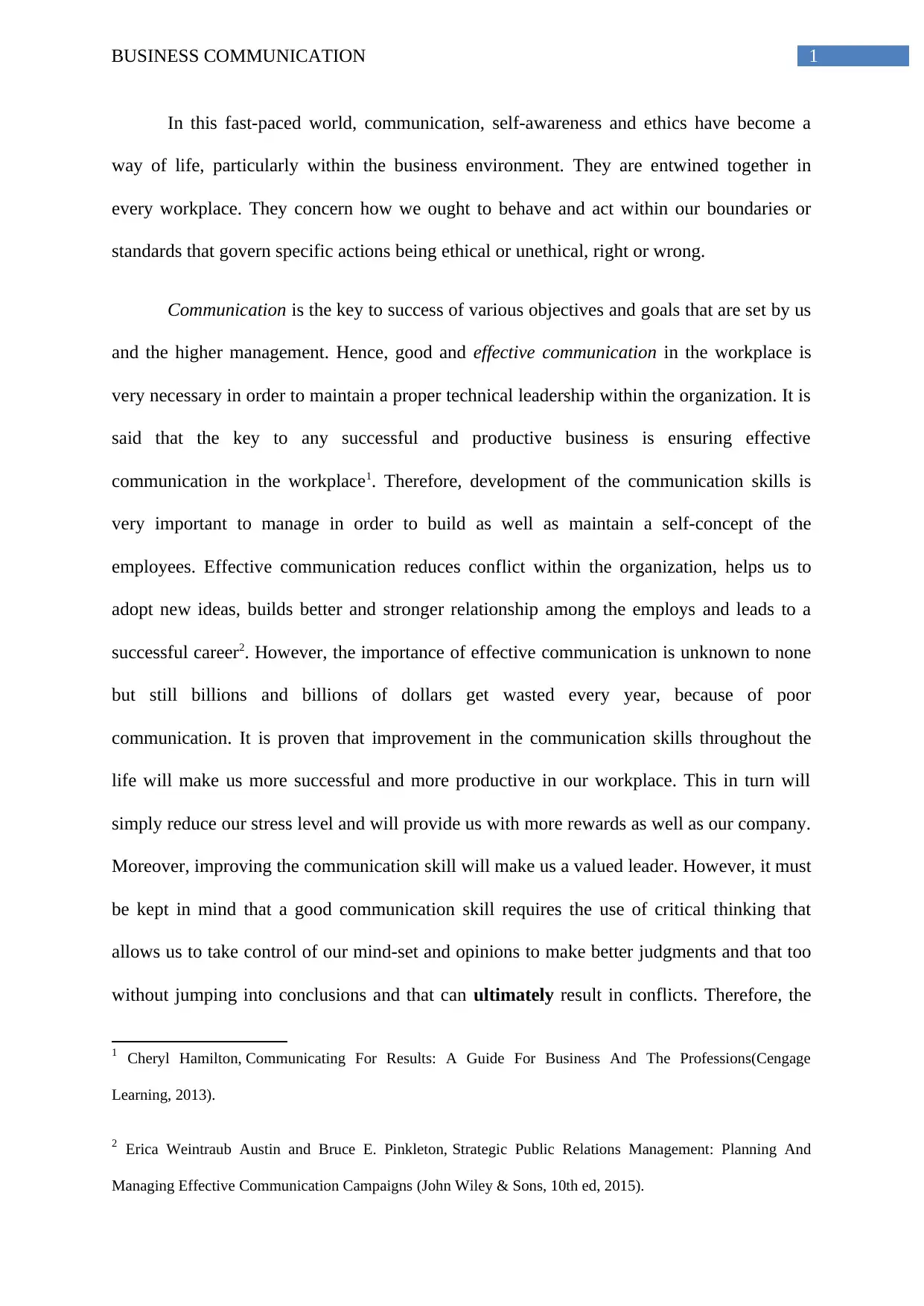
1BUSINESS COMMUNICATION
In this fast-paced world, communication, self-awareness and ethics have become a
way of life, particularly within the business environment. They are entwined together in
every workplace. They concern how we ought to behave and act within our boundaries or
standards that govern specific actions being ethical or unethical, right or wrong.
Communication is the key to success of various objectives and goals that are set by us
and the higher management. Hence, good and effective communication in the workplace is
very necessary in order to maintain a proper technical leadership within the organization. It is
said that the key to any successful and productive business is ensuring effective
communication in the workplace1. Therefore, development of the communication skills is
very important to manage in order to build as well as maintain a self-concept of the
employees. Effective communication reduces conflict within the organization, helps us to
adopt new ideas, builds better and stronger relationship among the employs and leads to a
successful career2. However, the importance of effective communication is unknown to none
but still billions and billions of dollars get wasted every year, because of poor
communication. It is proven that improvement in the communication skills throughout the
life will make us more successful and more productive in our workplace. This in turn will
simply reduce our stress level and will provide us with more rewards as well as our company.
Moreover, improving the communication skill will make us a valued leader. However, it must
be kept in mind that a good communication skill requires the use of critical thinking that
allows us to take control of our mind-set and opinions to make better judgments and that too
without jumping into conclusions and that can ultimately result in conflicts. Therefore, the
1 Cheryl Hamilton, Communicating For Results: A Guide For Business And The Professions(Cengage
Learning, 2013).
2 Erica Weintraub Austin and Bruce E. Pinkleton, Strategic Public Relations Management: Planning And
Managing Effective Communication Campaigns (John Wiley & Sons, 10th ed, 2015).
In this fast-paced world, communication, self-awareness and ethics have become a
way of life, particularly within the business environment. They are entwined together in
every workplace. They concern how we ought to behave and act within our boundaries or
standards that govern specific actions being ethical or unethical, right or wrong.
Communication is the key to success of various objectives and goals that are set by us
and the higher management. Hence, good and effective communication in the workplace is
very necessary in order to maintain a proper technical leadership within the organization. It is
said that the key to any successful and productive business is ensuring effective
communication in the workplace1. Therefore, development of the communication skills is
very important to manage in order to build as well as maintain a self-concept of the
employees. Effective communication reduces conflict within the organization, helps us to
adopt new ideas, builds better and stronger relationship among the employs and leads to a
successful career2. However, the importance of effective communication is unknown to none
but still billions and billions of dollars get wasted every year, because of poor
communication. It is proven that improvement in the communication skills throughout the
life will make us more successful and more productive in our workplace. This in turn will
simply reduce our stress level and will provide us with more rewards as well as our company.
Moreover, improving the communication skill will make us a valued leader. However, it must
be kept in mind that a good communication skill requires the use of critical thinking that
allows us to take control of our mind-set and opinions to make better judgments and that too
without jumping into conclusions and that can ultimately result in conflicts. Therefore, the
1 Cheryl Hamilton, Communicating For Results: A Guide For Business And The Professions(Cengage
Learning, 2013).
2 Erica Weintraub Austin and Bruce E. Pinkleton, Strategic Public Relations Management: Planning And
Managing Effective Communication Campaigns (John Wiley & Sons, 10th ed, 2015).
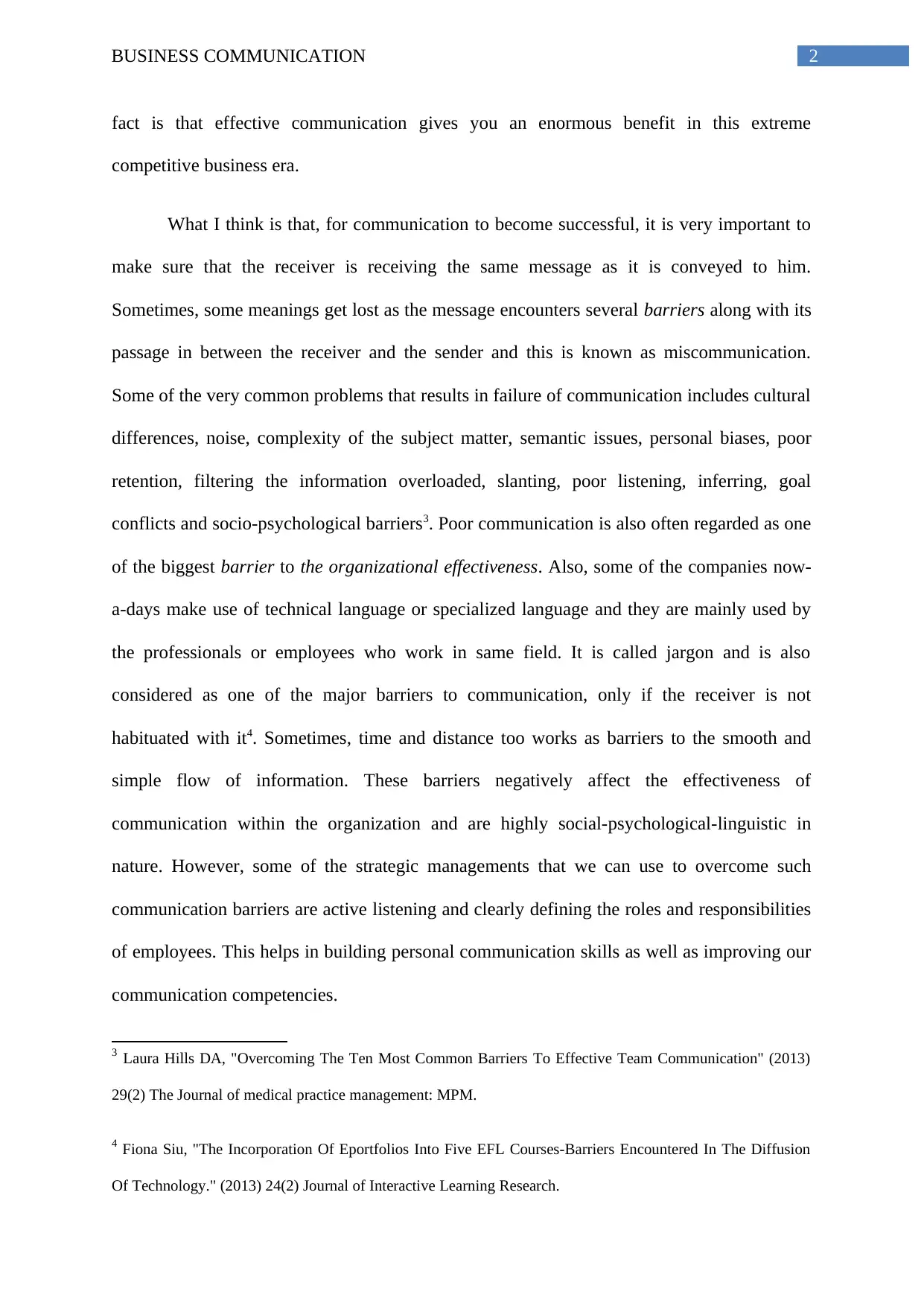
2BUSINESS COMMUNICATION
fact is that effective communication gives you an enormous benefit in this extreme
competitive business era.
What I think is that, for communication to become successful, it is very important to
make sure that the receiver is receiving the same message as it is conveyed to him.
Sometimes, some meanings get lost as the message encounters several barriers along with its
passage in between the receiver and the sender and this is known as miscommunication.
Some of the very common problems that results in failure of communication includes cultural
differences, noise, complexity of the subject matter, semantic issues, personal biases, poor
retention, filtering the information overloaded, slanting, poor listening, inferring, goal
conflicts and socio-psychological barriers3. Poor communication is also often regarded as one
of the biggest barrier to the organizational effectiveness. Also, some of the companies now-
a-days make use of technical language or specialized language and they are mainly used by
the professionals or employees who work in same field. It is called jargon and is also
considered as one of the major barriers to communication, only if the receiver is not
habituated with it4. Sometimes, time and distance too works as barriers to the smooth and
simple flow of information. These barriers negatively affect the effectiveness of
communication within the organization and are highly social-psychological-linguistic in
nature. However, some of the strategic managements that we can use to overcome such
communication barriers are active listening and clearly defining the roles and responsibilities
of employees. This helps in building personal communication skills as well as improving our
communication competencies.
3 Laura Hills DA, "Overcoming The Ten Most Common Barriers To Effective Team Communication" (2013)
29(2) The Journal of medical practice management: MPM.
4 Fiona Siu, "The Incorporation Of Eportfolios Into Five EFL Courses-Barriers Encountered In The Diffusion
Of Technology." (2013) 24(2) Journal of Interactive Learning Research.
fact is that effective communication gives you an enormous benefit in this extreme
competitive business era.
What I think is that, for communication to become successful, it is very important to
make sure that the receiver is receiving the same message as it is conveyed to him.
Sometimes, some meanings get lost as the message encounters several barriers along with its
passage in between the receiver and the sender and this is known as miscommunication.
Some of the very common problems that results in failure of communication includes cultural
differences, noise, complexity of the subject matter, semantic issues, personal biases, poor
retention, filtering the information overloaded, slanting, poor listening, inferring, goal
conflicts and socio-psychological barriers3. Poor communication is also often regarded as one
of the biggest barrier to the organizational effectiveness. Also, some of the companies now-
a-days make use of technical language or specialized language and they are mainly used by
the professionals or employees who work in same field. It is called jargon and is also
considered as one of the major barriers to communication, only if the receiver is not
habituated with it4. Sometimes, time and distance too works as barriers to the smooth and
simple flow of information. These barriers negatively affect the effectiveness of
communication within the organization and are highly social-psychological-linguistic in
nature. However, some of the strategic managements that we can use to overcome such
communication barriers are active listening and clearly defining the roles and responsibilities
of employees. This helps in building personal communication skills as well as improving our
communication competencies.
3 Laura Hills DA, "Overcoming The Ten Most Common Barriers To Effective Team Communication" (2013)
29(2) The Journal of medical practice management: MPM.
4 Fiona Siu, "The Incorporation Of Eportfolios Into Five EFL Courses-Barriers Encountered In The Diffusion
Of Technology." (2013) 24(2) Journal of Interactive Learning Research.
⊘ This is a preview!⊘
Do you want full access?
Subscribe today to unlock all pages.

Trusted by 1+ million students worldwide
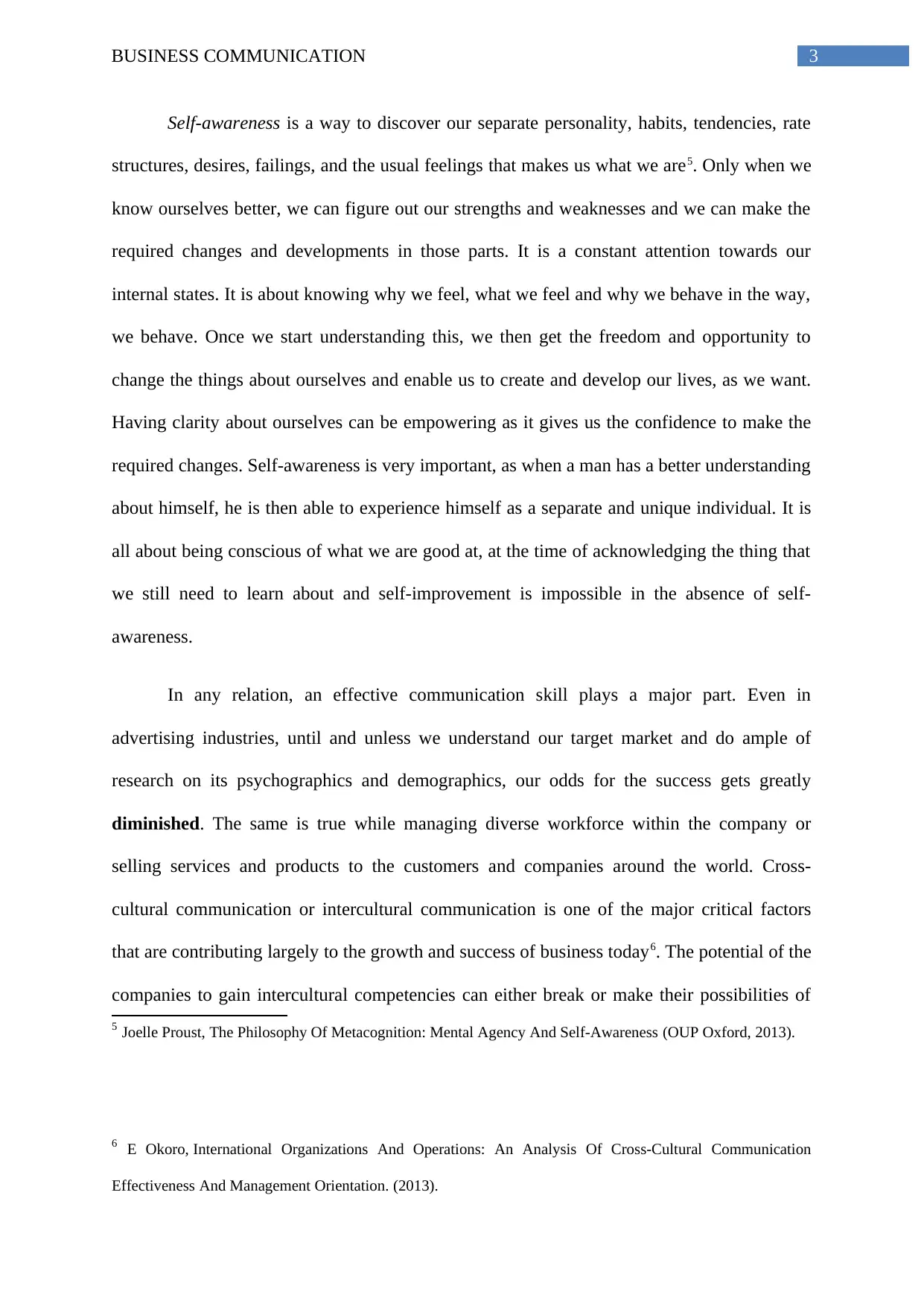
3BUSINESS COMMUNICATION
Self-awareness is a way to discover our separate personality, habits, tendencies, rate
structures, desires, failings, and the usual feelings that makes us what we are5. Only when we
know ourselves better, we can figure out our strengths and weaknesses and we can make the
required changes and developments in those parts. It is a constant attention towards our
internal states. It is about knowing why we feel, what we feel and why we behave in the way,
we behave. Once we start understanding this, we then get the freedom and opportunity to
change the things about ourselves and enable us to create and develop our lives, as we want.
Having clarity about ourselves can be empowering as it gives us the confidence to make the
required changes. Self-awareness is very important, as when a man has a better understanding
about himself, he is then able to experience himself as a separate and unique individual. It is
all about being conscious of what we are good at, at the time of acknowledging the thing that
we still need to learn about and self-improvement is impossible in the absence of self-
awareness.
In any relation, an effective communication skill plays a major part. Even in
advertising industries, until and unless we understand our target market and do ample of
research on its psychographics and demographics, our odds for the success gets greatly
diminished. The same is true while managing diverse workforce within the company or
selling services and products to the customers and companies around the world. Cross-
cultural communication or intercultural communication is one of the major critical factors
that are contributing largely to the growth and success of business today6. The potential of the
companies to gain intercultural competencies can either break or make their possibilities of
5 Joelle Proust, The Philosophy Of Metacognition: Mental Agency And Self-Awareness (OUP Oxford, 2013).
6 E Okoro, International Organizations And Operations: An Analysis Of Cross-Cultural Communication
Effectiveness And Management Orientation. (2013).
Self-awareness is a way to discover our separate personality, habits, tendencies, rate
structures, desires, failings, and the usual feelings that makes us what we are5. Only when we
know ourselves better, we can figure out our strengths and weaknesses and we can make the
required changes and developments in those parts. It is a constant attention towards our
internal states. It is about knowing why we feel, what we feel and why we behave in the way,
we behave. Once we start understanding this, we then get the freedom and opportunity to
change the things about ourselves and enable us to create and develop our lives, as we want.
Having clarity about ourselves can be empowering as it gives us the confidence to make the
required changes. Self-awareness is very important, as when a man has a better understanding
about himself, he is then able to experience himself as a separate and unique individual. It is
all about being conscious of what we are good at, at the time of acknowledging the thing that
we still need to learn about and self-improvement is impossible in the absence of self-
awareness.
In any relation, an effective communication skill plays a major part. Even in
advertising industries, until and unless we understand our target market and do ample of
research on its psychographics and demographics, our odds for the success gets greatly
diminished. The same is true while managing diverse workforce within the company or
selling services and products to the customers and companies around the world. Cross-
cultural communication or intercultural communication is one of the major critical factors
that are contributing largely to the growth and success of business today6. The potential of the
companies to gain intercultural competencies can either break or make their possibilities of
5 Joelle Proust, The Philosophy Of Metacognition: Mental Agency And Self-Awareness (OUP Oxford, 2013).
6 E Okoro, International Organizations And Operations: An Analysis Of Cross-Cultural Communication
Effectiveness And Management Orientation. (2013).
Paraphrase This Document
Need a fresh take? Get an instant paraphrase of this document with our AI Paraphraser
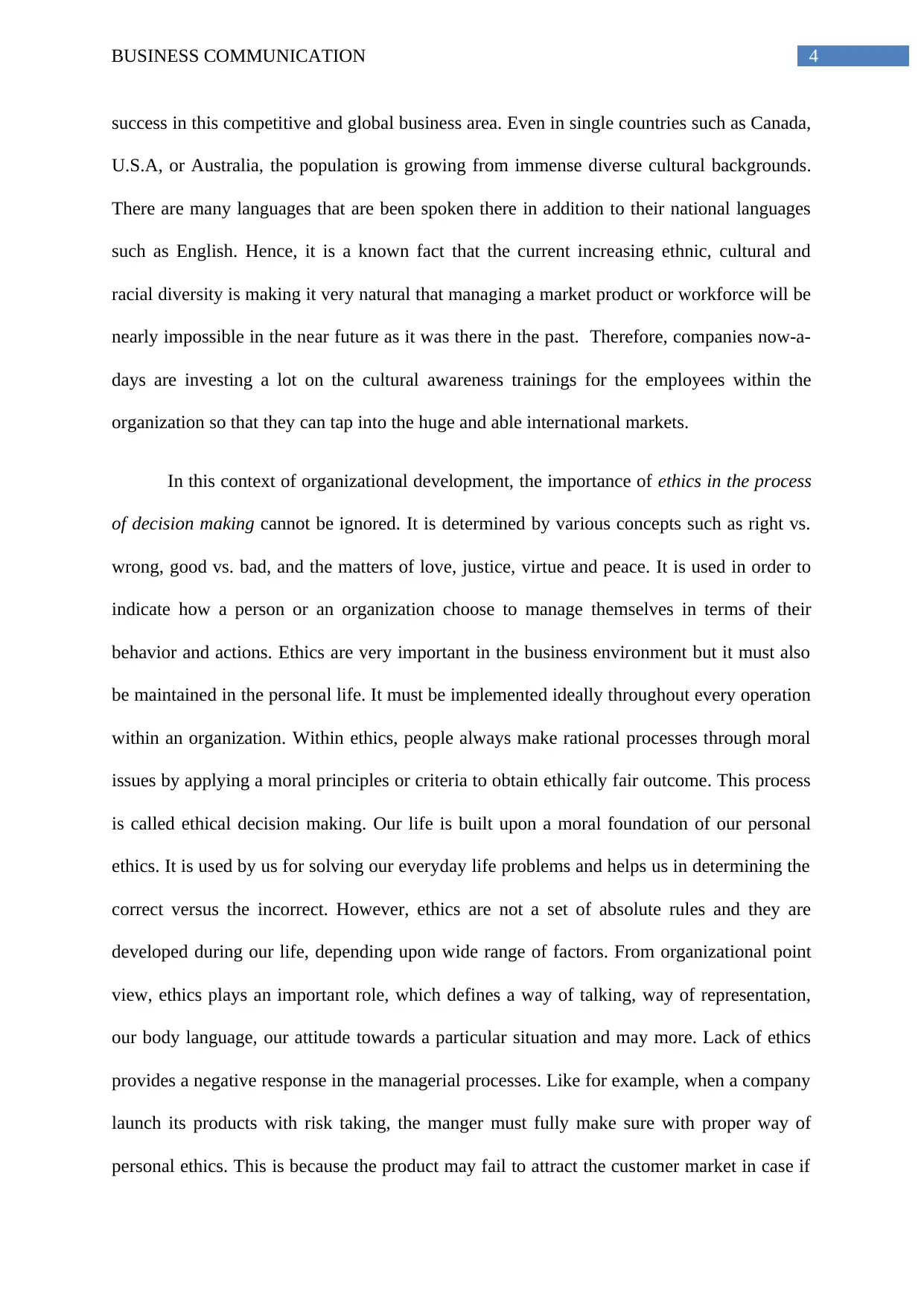
4BUSINESS COMMUNICATION
success in this competitive and global business area. Even in single countries such as Canada,
U.S.A, or Australia, the population is growing from immense diverse cultural backgrounds.
There are many languages that are been spoken there in addition to their national languages
such as English. Hence, it is a known fact that the current increasing ethnic, cultural and
racial diversity is making it very natural that managing a market product or workforce will be
nearly impossible in the near future as it was there in the past. Therefore, companies now-a-
days are investing a lot on the cultural awareness trainings for the employees within the
organization so that they can tap into the huge and able international markets.
In this context of organizational development, the importance of ethics in the process
of decision making cannot be ignored. It is determined by various concepts such as right vs.
wrong, good vs. bad, and the matters of love, justice, virtue and peace. It is used in order to
indicate how a person or an organization choose to manage themselves in terms of their
behavior and actions. Ethics are very important in the business environment but it must also
be maintained in the personal life. It must be implemented ideally throughout every operation
within an organization. Within ethics, people always make rational processes through moral
issues by applying a moral principles or criteria to obtain ethically fair outcome. This process
is called ethical decision making. Our life is built upon a moral foundation of our personal
ethics. It is used by us for solving our everyday life problems and helps us in determining the
correct versus the incorrect. However, ethics are not a set of absolute rules and they are
developed during our life, depending upon wide range of factors. From organizational point
view, ethics plays an important role, which defines a way of talking, way of representation,
our body language, our attitude towards a particular situation and may more. Lack of ethics
provides a negative response in the managerial processes. Like for example, when a company
launch its products with risk taking, the manger must fully make sure with proper way of
personal ethics. This is because the product may fail to attract the customer market in case if
success in this competitive and global business area. Even in single countries such as Canada,
U.S.A, or Australia, the population is growing from immense diverse cultural backgrounds.
There are many languages that are been spoken there in addition to their national languages
such as English. Hence, it is a known fact that the current increasing ethnic, cultural and
racial diversity is making it very natural that managing a market product or workforce will be
nearly impossible in the near future as it was there in the past. Therefore, companies now-a-
days are investing a lot on the cultural awareness trainings for the employees within the
organization so that they can tap into the huge and able international markets.
In this context of organizational development, the importance of ethics in the process
of decision making cannot be ignored. It is determined by various concepts such as right vs.
wrong, good vs. bad, and the matters of love, justice, virtue and peace. It is used in order to
indicate how a person or an organization choose to manage themselves in terms of their
behavior and actions. Ethics are very important in the business environment but it must also
be maintained in the personal life. It must be implemented ideally throughout every operation
within an organization. Within ethics, people always make rational processes through moral
issues by applying a moral principles or criteria to obtain ethically fair outcome. This process
is called ethical decision making. Our life is built upon a moral foundation of our personal
ethics. It is used by us for solving our everyday life problems and helps us in determining the
correct versus the incorrect. However, ethics are not a set of absolute rules and they are
developed during our life, depending upon wide range of factors. From organizational point
view, ethics plays an important role, which defines a way of talking, way of representation,
our body language, our attitude towards a particular situation and may more. Lack of ethics
provides a negative response in the managerial processes. Like for example, when a company
launch its products with risk taking, the manger must fully make sure with proper way of
personal ethics. This is because the product may fail to attract the customer market in case if
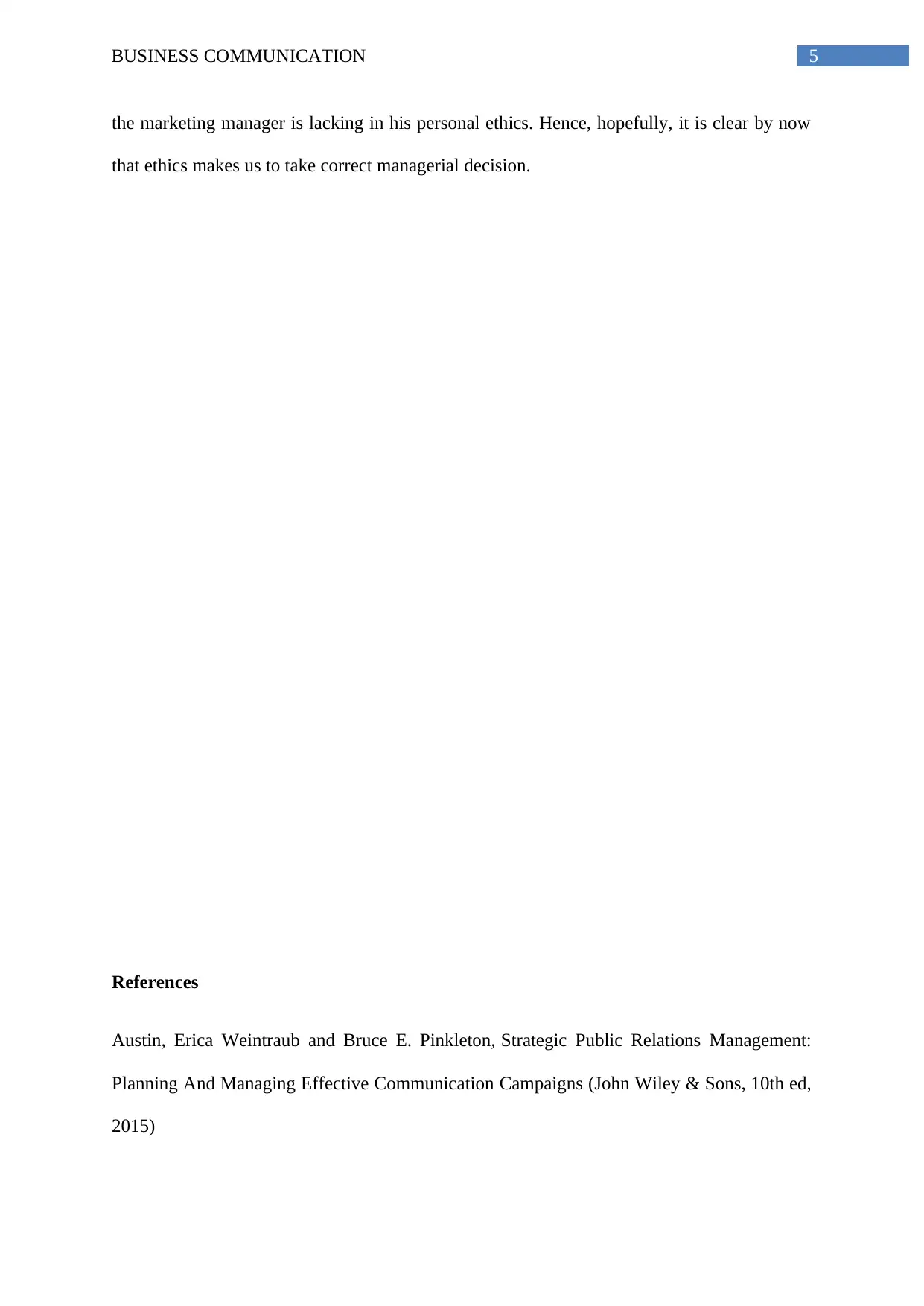
5BUSINESS COMMUNICATION
the marketing manager is lacking in his personal ethics. Hence, hopefully, it is clear by now
that ethics makes us to take correct managerial decision.
References
Austin, Erica Weintraub and Bruce E. Pinkleton, Strategic Public Relations Management:
Planning And Managing Effective Communication Campaigns (John Wiley & Sons, 10th ed,
2015)
the marketing manager is lacking in his personal ethics. Hence, hopefully, it is clear by now
that ethics makes us to take correct managerial decision.
References
Austin, Erica Weintraub and Bruce E. Pinkleton, Strategic Public Relations Management:
Planning And Managing Effective Communication Campaigns (John Wiley & Sons, 10th ed,
2015)
⊘ This is a preview!⊘
Do you want full access?
Subscribe today to unlock all pages.

Trusted by 1+ million students worldwide
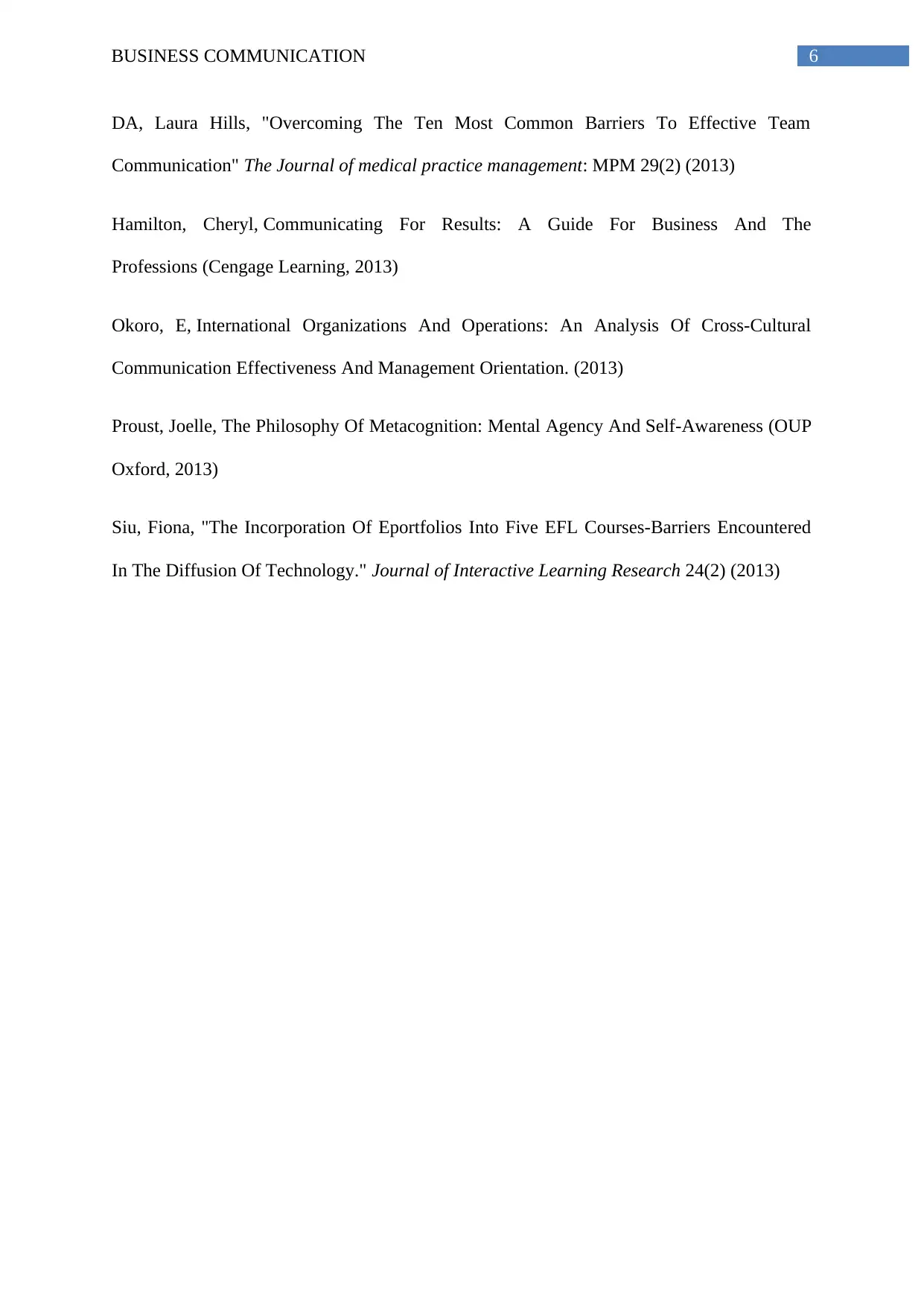
6BUSINESS COMMUNICATION
DA, Laura Hills, "Overcoming The Ten Most Common Barriers To Effective Team
Communication" The Journal of medical practice management: MPM 29(2) (2013)
Hamilton, Cheryl, Communicating For Results: A Guide For Business And The
Professions (Cengage Learning, 2013)
Okoro, E, International Organizations And Operations: An Analysis Of Cross-Cultural
Communication Effectiveness And Management Orientation. (2013)
Proust, Joelle, The Philosophy Of Metacognition: Mental Agency And Self-Awareness (OUP
Oxford, 2013)
Siu, Fiona, "The Incorporation Of Eportfolios Into Five EFL Courses-Barriers Encountered
In The Diffusion Of Technology." Journal of Interactive Learning Research 24(2) (2013)
DA, Laura Hills, "Overcoming The Ten Most Common Barriers To Effective Team
Communication" The Journal of medical practice management: MPM 29(2) (2013)
Hamilton, Cheryl, Communicating For Results: A Guide For Business And The
Professions (Cengage Learning, 2013)
Okoro, E, International Organizations And Operations: An Analysis Of Cross-Cultural
Communication Effectiveness And Management Orientation. (2013)
Proust, Joelle, The Philosophy Of Metacognition: Mental Agency And Self-Awareness (OUP
Oxford, 2013)
Siu, Fiona, "The Incorporation Of Eportfolios Into Five EFL Courses-Barriers Encountered
In The Diffusion Of Technology." Journal of Interactive Learning Research 24(2) (2013)
1 out of 7
Related Documents
Your All-in-One AI-Powered Toolkit for Academic Success.
+13062052269
info@desklib.com
Available 24*7 on WhatsApp / Email
![[object Object]](/_next/static/media/star-bottom.7253800d.svg)
Unlock your academic potential
Copyright © 2020–2026 A2Z Services. All Rights Reserved. Developed and managed by ZUCOL.





